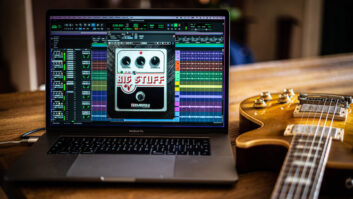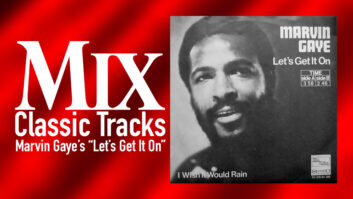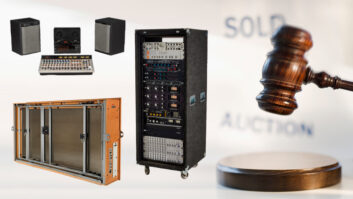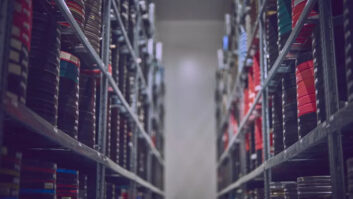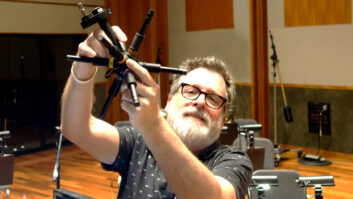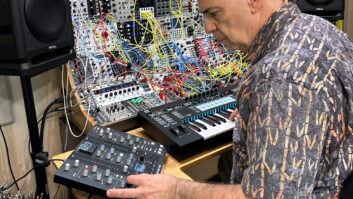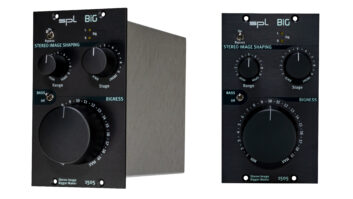
The July, 2015 issue of Pro Sound News profiles recording studio Veneto West; what follows is additional exploration into the facility and mindset of producer, mixer, engineer and recording artist, Ronan Chris Murphy.
“I love teaching; my father always wanted me to be a teacher,” says Murphy. “But I never wanted to teach in an institution.” His Recording Boot Camps (recordingbootcamp.com) are as much about social interaction as education: “We’re all recording nerds—we’d hang out and talk about this stuff over dinner for free.”
But the camps also serve a much-needed function in an industry that has largely abandoned the concept of mentoring. Recording tools are so inexpensive that anyone can set themselves up to produce at home, yet there is a definite downside to working in isolation.
“So many of the old traditions for the way you would learn stuff in the past don’t exist anymore in any substantial way. Some of the basic things that somebody would have learned in their first month or two apprenticing, these people who have been recording by themselves for three, four, five years just don’t experience that,” he says. “When you apprentice under somebody, even for a short time, you get to see where you need to focus to get the job done, to make it sound great, to keep the client happy, to keep the electric bill paid.”
Some things can only be learned on the job: “You can’t learn in school what to do when your singer has a meltdown, or the guitar player fell off the wagon the night before but you still have to deliver an album by Monday morning. There’s so much that is subjective, and workflow, and client relations. Those are things you can’t learn without having been there.”
But perhaps the biggest loss is not being able to experience the wide range of music that you might typically encounter as an apprentice in a commercial facility. “It’s one of the things I like to try and convey in the Recording Boot Camps, getting a chance to really see a wide range of experience. People don’t realize that the laws of physics don’t change when you move from country music to heavy metal.”
There is also a lot to be said for limiting your tools, he believes. “I was thinking how lucky I was to come up in a time when I didn’t have much of anything. I started with a 4-track cassette, at tiny studios that had one compressor and one reverb. I was cutting my teeth with that for years, moving from hip-hop to rock to pop. It forced me to learn and understand the real building blocks of recording.
“When you’ve got a compressor and you don’t know how to use it, and mic choice and placement, you really learn the core things that matter. You develop an innate understanding—this is how to get a snare drum to pop, without downloading some plug-in bundle. With just a few tools you can be so much more creative. People get so complicated that I think it interferes with their ability to be creative.”
Just take a look at some of the online forums, he suggests. “It’s amazing the answers that you’ll see to a question on how to get vocals to cut through the mix. An answer will come back: you need to purchase this aural exciter plug-in and sidechain that and use some mid-side Haas effect to spread it out. I’ve made hundreds of albums and my brain has trouble wrapping around it.” Nobody offers the most basic answer, he says: “Try a little more compression, and carve out some frequencies in the guitars that are fighting the vocal.”
In the Recording Boot Camp, he continues, “We’ll take a good mic into the Pacifica into a good preamp and, without turning on the speakers, we’ll record acoustic guitar, voice, percussion, harmonium and things like that. Then we listen. It blows their minds. They’ll say, ‘That’s better than any acoustic guitar sound I’ve ever gotten.’ If you have a good front end and don’t screw it up you can get a pretty darn good mix without processing of any sort. And you can get a really good mix with the stock plug-ins that came with your DAW.”
Murphy’s hybrid set-up offers the best of both worlds when it comes to processing. “For clean and tweaky, plug-ins work quite well,” he says. “Where analog tends to have its place is when you want to do big, broad-stroke tone tweaks. I find that to be easier with hardware, and easier to push something dramatically.”
The changeover from a large analog mixing console to his new hybrid and modular system came down to one thing, says Murphy: “Recall. That is the entire story. The world of the work we do has changed so substantially that recall is just a given.
“Clients will no longer accept that it’s not immediate. They’ll tell you otherwise; they’ll say, ‘I want the big analog sound.’ I’ll say, great, but if we do that we can’t do instant recall. ‘No, I totally want that sound.’ So you do the record and three weeks later there are pages of revision notes that show up.”
He comments, “I enjoyed the workflow and certain kinds of sounds and techniques that I could use on a console that don’t translate to in-the-box or hybrid set-ups. I was promoting the idea of the difference in the articulation in the low frequencies or the phase coherence,” but those weren’t priorities for his clients. So the console had to go.
“I still have clients who love to work the old way, and we get to do that,” booking time in other facilities. For example, “The last record I just mixed in Europe was all analog, to two-inch tape, mixing to quarter-inch. Personally and emotionally I just love that.”
Murphy has been working to simplify things outside the studio, too. “I’m becoming more obsessed with stripping things down and trying to work with real people in real environments, and finding interesting ways to do it, even for electronic music. I’m really into remote recording—an Apogee Duet 2 and a laptop, or my Zoom H4N—and going around the world to non-traditional environments and recording people outside, in practice spaces or in people’s kitchens. That’s more exciting to me,” he says.
“I was thinking about the things that I helped contribute, the records that mean the most. Virtually none of it is about the record where I really got the stereo spread of the guitars, or got the voice to sound like this in relationship to the organ.”
Rather, he says, “I’ll remember, that’s the time where I had this human experience. I think about the dinners we had together, the fights we had over whether the world will end if we play the organ in that octave versus this octave. The Middle East is a cakewalk compared to who is going to be right about whether we play that legato or staccato.
“Those are the things that mean the most, where we hashed it out and had that human experience. I’m glad my life allowed this to happen.”
